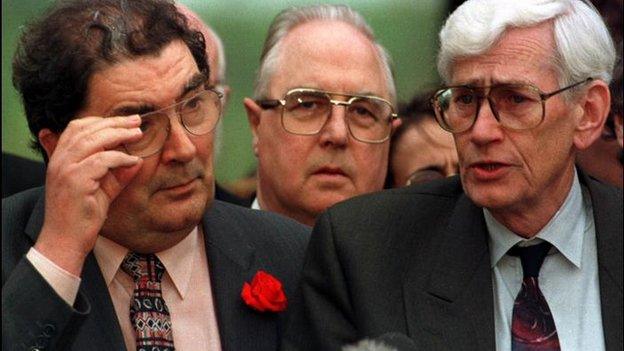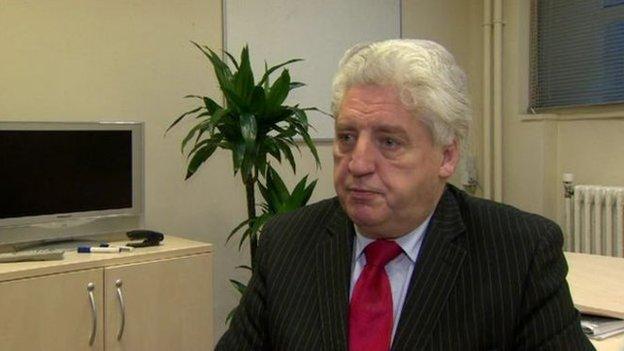Election profile: SDLP
- Published
The SDLP is the second largest nationalist party in Northern Ireland and draws its support mainly from within the Catholic community.
The party was born in 1970 out of the civil rights movement that preceded the Troubles.
Many of its founding members, drawn mainly from the Nationalist Party, the National Democratic Party and Republican Labour, were key figures in the civil rights campaigns.
Those campaigns grew around Northern Ireland as Catholics demanded an end to what they saw as sectarian discrimination by the then Stormont government.
Belfast Agreement


John Hume and his then deputy Seamus Mallon at the end of political negotiations in 1998
Former leaders John Hume and Mark Durkan are seen as two of the main architects of the 1998 Good Friday Agreement.
The SDLP was the dominant political force among Northern Ireland nationalists until 2003 when it was overtaken by Sinn Féin at the Northern Ireland Assembly election.
It currently has three MPs at Westminster and 14 MLAs at Stormont.
While it supports the principle of a united Ireland, the party stresses this should come about peacefully and with the consent of the people in Northern Ireland.
Internal review
Since an internal review suggested it was losing voters to Sinn Féin because of its "tired and middle class image", it has tried to modernise itself to attract more young and non-Catholic voters.
Historically, the SDLP has had close links with Britain's Labour Party, and votes with Labour in the House of Commons on many issues.
2015 has provided plenty of headaches for the SDLP.
The party tried to amend the controversial Welfare Reform Bill, but was criticised by those who pointed out it had backed a deal to implement the measure.
There was also unionist anger over the actions of its party councillors in Newry and Mourne after the council agreed to retain the name of a play park, called after an IRA man.
The playground is named after Raymond McCreesh, who died on hunger strike in prison in 1981.
Eight out of nine SDLP councillors failed to attend a committee meeting where the vote was taken.
Controversial remarks


Alasdair McDonnell has caused controversy over recent remarks about abortion
The party has since clarified its position that no public space should be named after those involved in paramilitary violence.
Party leader Alasdair McDonnell has also stirred controversy over remarks in a BBC interview when he stated his party's opposition to abortion in cases of lethal foetal abnormality or rape.
Dr McDonnell, a GP, said doctors cannot predict when a foetus has a lethal abnormality.
That earned him plaudits from pro-life campaigners, but criticism from other medical professionals.